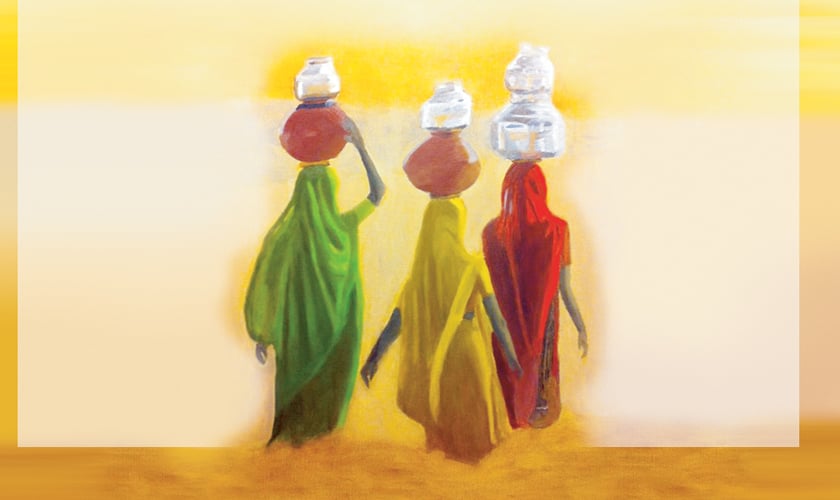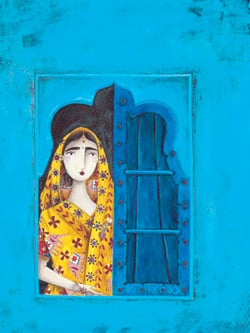“Bibi Sahib, Nimu is growing older, maybe I could send her to the next village’s school. Rehmat Bibi says they are teaching girls too but... but money is needed... I thought...” Siddu faltered, looking at the expression of mirth forming slowly on the woman’s face.
Deserts and dreams - part II
“Bibi Sahib, Nimu is growing older, maybe I could send her to the next village’s school. Rehmat Bibi says they are teaching girls too but... but money is needed... I thought...” Siddu faltered, looking at the expression of mirth forming slowly on the woman’s face.
“What do you want money for, Siddu bibi?” she stood up, chuckling. “I give you old clothes, I give you water, I give you leftover food (which is abundant, mind you). What do you want money for?”
“School, bibi sahib.... Nimu is growing... I thought...” Siddu fell silent, trying to form a proper sentence. Suddenly, she wanted to jump back in time and not ask this of the well-owner’s wife.
Siddu had learned very late in life to wish and hope for things, and her delicate, crystalline dreams could not bear being laughed at by this woman.

“Believe me, Siddu, sending that - thing - to school is not a good idea. It will be enough for her to grow up big, strong and silent. Being a fatherless bastard is enough for her not to get married, being educated will be the last straw. No one will marry the poor thing.” The well-owner’s wife tutted sadly, and looked away, not noticing that suddenly Siddu was standing taller, her thin, weary face burning up, her fists clenching.
The woman didn’t realize anything was wrong until she heard the cold, livid voice of her housemaid.
“Bastard yourself, Bibi Sahib.”
Siddu left the well-owner’s house that very day.
**********************************
The hopes and desires Nimu had started watering inside Siddu’s parched soul lasted much longer than the water Siddu brought on her last day of work from the well. The villagers offered her a little of their precious water for a few days, but when they saw that Siddu did not return to the well-owner’s house again, they stopped.
“She has to earn her keep,” they said.
“Water is too precious to waste on idle bodies,” they pronounced.
Still Siddu sat in her house, weaving webs of dreams where she scuttled like a happy little spider. The thirst gnawing at her skin, the hunger gnawing at her soul, went ignored.
Her husband pushed her out the door, dragged her out the village, and beat her till she was bruised all over, but she refused to return to the well-owner’s wife and apologize.

Siddu walked to the next village’s well-owner, asked for a job that was paid half in water, half in money; she was refused. She returned home blissfully.
She walked to the army medical camp, offered to clean the place if she was paid half in water, half in money; she was refused, yet she turned back hopefully.
She walked around the village, offering her services for anything if she was paid half in water, half in money. She was refused.
Yet she persisted, “Nimu is growing.” She said. “She needs to be educated.”
Then, one day, Siddu woke, and Nimu was not in her house, nor was her husband. She knew the only thing he had ever wanted to do with her Nimu was kill her, and the very idea killed something inside Siddu.
She walked around the village, her face ashen. The very thought of what he was doing to her Nimu at this very moment filled her with horror. With a tear-streaked face, she looked for Nimu in every mud house. The dusty hands shaking with weakness parted every bush, dreading she would see Nimu’s strangled body nestling among them.
It was twilight when Siddu finally entered her mud house, her body aching.
She nearly keeled over at the sight of her husband and Nimu, sitting on the sleeping mat with food spread before them, chewing contentedly.
She crept up to them, and when she spoke, her voice was hoarse.
“Where were you?” she said to Nimu, and without waiting for her answer, she turned to her husband, filled with rage. “Where did you take her?”
He shrugged. “She woke me in the morning, said she wanted to go to the well-owner’s house, then we went to the village mullah.”
“Why did you go the well-owner’s house?” Siddu asked, her throat closing up. The word “bastard” was still alive in her memory, a sting from a giant, rich bee.
He looked at Nimu, and Nimu looked back at him, chewing silently. She never did answer for herself.
He made a ball of the rice on the clay plate and turned it over and over in his fingers.
“The well-owner’s Bibi has given Nimu a job.” He said, his voice muffled by the food in his mouth. “She will pay her in water, but she says she will give her old clothes and leftover food.” He paused, and then, in a slightly lower voice (or did she imagine it?), he added, “The village mullah says it is halal,”
“What is halal?” she asked uncomprehendingly, looking from one to the other.
“Marrying another woman if your wife does not provide for your comforts,” he said, looking with a fascinated expression at the sleeping mat. “I married Nimu, in the afternoon.”
Siddu realized this was the first time he had actually taken Nimu’s name. For a second, fury boiled up inside her like a cloud that swells with water before thundering down upon the world. Then her desires flew out of her and merged into all her hopes and dreams, together they stood behind her, their red eyes glowing at her, their heels drumming against the floor, waiting for her to turn around and reach for them so they could turn her into stone.
Siddu’s soul poked a finger into the dark hole that had sprung up inside her again in a matter of seconds, and then she sat down resignedly (but not on the mat, that was for the bride and groom), took a handful of the rice left over from the well-owner’s last party, and began to eat slowly.